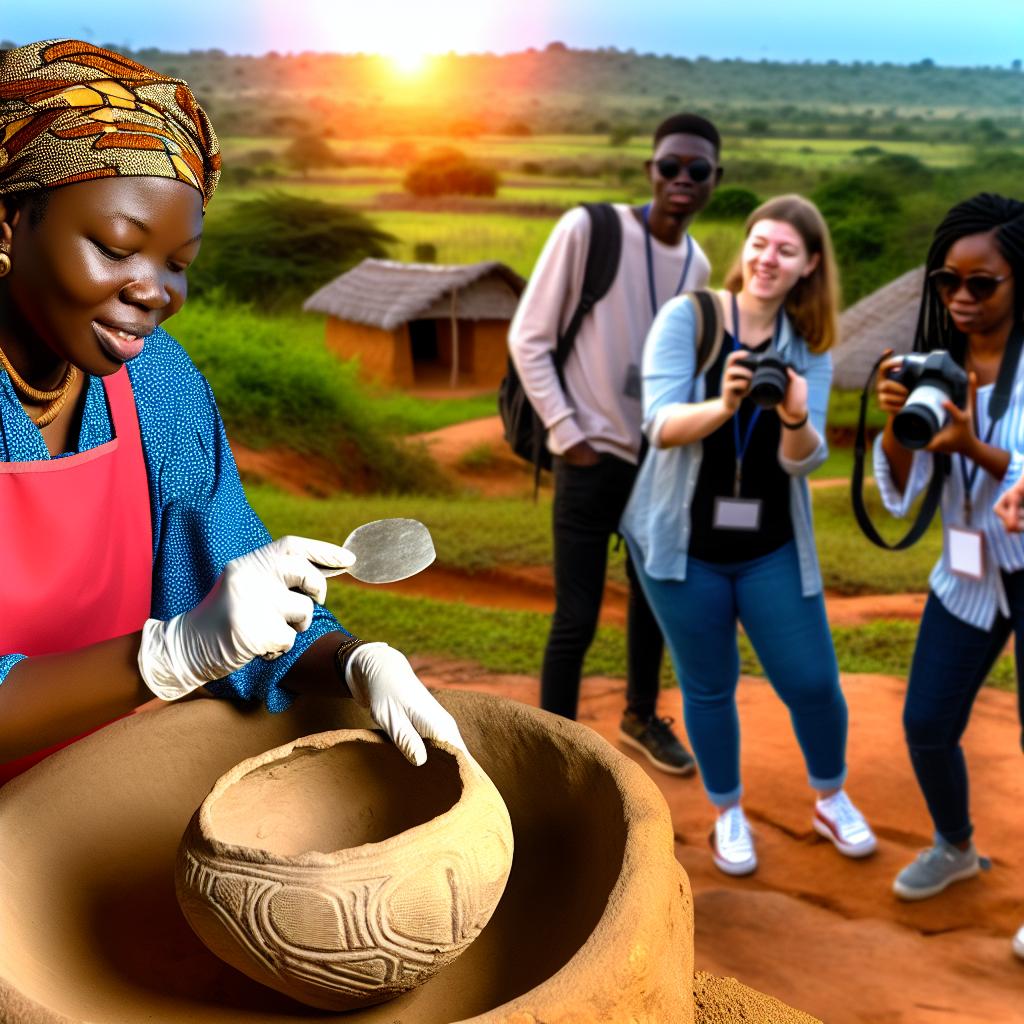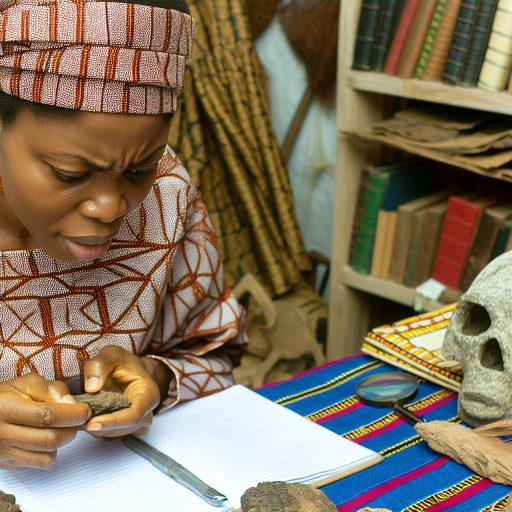Introduction:
Archaeology is the study of human history and prehistory through excavation and analysis of artifacts.
It plays a crucial role in understanding Nigeria’s rich culture and heritage.
By uncovering ancient sites and artifacts, archaeology creates a connection to the past.
This tangible link to history can attract tourists interested in exploring Nigeria’s diverse cultural roots.
Archaeological discoveries draw attention to Nigeria’s unique history and cultural identity.
Archaeological Sites in Nigeria:
There are several important archaeological sites in Nigeria that showcase the country’s rich history and cultural heritage.
These sites not only provide valuable insights into Nigeria’s past but also attract tourists interested in history and culture.
Nok Settlement:
- The Nok Settlement is one of the most famous archaeological sites in Nigeria.
- It dates back to around 500 BC and is known for its terracotta figurines.
- These figurines provide evidence of a sophisticated ancient culture in Nigeria.
- Tourists visiting the Nok Settlement can learn about the early civilization in Nigeria.
Ife Museum:
- The Ife Museum is located in the town of Ife and houses artifacts from the ancient city of Ife.
- These artifacts include bronze and terracotta sculptures that represent Ife’s artistic legacy.
- Tourists can explore the museum to understand the artistic traditions of the Yoruba people.
Sungbo’s Eredo:
- Sungbo’s Eredo is an ancient earthwork located in present-day Ijebu-Ode, Ogun State.
- It is believed to have been built in the 11th century and served as a defense system.
- Tourists can visit Sungbo’s Eredo to marvel at the engineering skills of the ancient inhabitants.
Benin City Walls:
- The Benin City Walls are a UNESCO World Heritage Site that dates back to the 13th century.
- These walls served as fortifications for the ancient Kingdom of Benin.
- Tourists interested in history can visit the Benin City Walls to learn about the kingdom’s military prowess.
Archaeological sites in Nigeria offer a glimpse into the country’s rich past and cultural heritage.
Tourists interested in history and culture can explore these sites to get a better understanding of Nigeria’s ancient civilizations.
Preservation of Archaeological Sites:
Preserving archaeological sites in Nigeria is crucial for maintaining the cultural heritage of the country.
- Importance of Preserving Archaeological Sites in Nigeria
- These sites provide valuable insights into Nigeria’s rich history and heritage.
- They serve as educational resources for researchers, historians, and tourists.
- Preservation ensures that future generations can learn from and appreciate these ancient civilizations.
Challenges Faced in Preserving these Sites:
- Lack of funding for conservation efforts.
- Illegal excavation and looting of artifacts by antiquities smugglers.
- Environmental factors such as erosion, climate change, and natural disasters.
- Urban development encroaching on archaeological sites.
Tourism’s Contribution to Preserving Archaeological Sites:
- Tourism creates revenue streams that can be directed towards conservation projects.
- Increased tourist interest leads to greater awareness and appreciation of heritage sites.
- Regulations and guidelines for responsible tourism can help protect sites from damage.
- Local communities benefit from tourism, incentivizing them to protect and preserve their heritage.
You Might Also Like: Notable Nigerian Anthropologists and Their Works
Cultural Tourism:
Archaeology plays a vital role in cultural tourism in Nigeria.
It showcases the rich history and heritage of the country.
Tourists can explore archaeological sites such as the Nok Culture.
Visitors can also see the Ife Bronze works and the Benin City walls.
These sites provide a glimpse into Nigeria’s past.
They allow tourists to learn about the traditions, customs, and beliefs of the different ethnic groups.
By visiting archaeological sites, tourists can immerse themselves in the history and culture of Nigeria.
This leads to a deeper appreciation for the country.
Potential Economic Benefits:
Cultural tourism has the potential to generate revenue.
It can benefit local communities and the Nigerian economy as a whole.
Visitors to archaeological sites often spend money on accommodations.
They spend on food, souvenirs, and transportation, boosting local businesses.
The preservation and promotion of archaeological sites create jobs.
This provides opportunities for local residents in the tourism industry.
Increased tourism traffic can stimulate economic growth.
This contributes to the overall development of Nigeria.
See Related Content: The Future of Chemical Sciences in Nigeria
Understanding History and Culture
Archaeology plays a crucial role in educating tourists about the rich history and diverse cultural heritage of Nigeria.
By exploring archaeological sites, tourists can gain insights into the ancient civilizations that once thrived in the region.
Hands-on Learning Experience
Visiting archaeological sites provides tourists with a hands-on learning experience that goes beyond reading textbooks or watching documentaries.
They can witness firsthand the artifacts, structures, and tools used by past societies, helping them connect with history in a tangible way.
Promoting Cultural Exchange
Archaeology serves as a bridge for cultural exchange and understanding between tourists and the local communities in Nigeria.
By engaging with archaeological sites and interacting with experts in the field, tourists can gain a deeper appreciation for the cultural traditions and practices of the region.
The educational value of archaeology in Nigerian tourism cannot be underestimated.
It offers tourists a unique opportunity to learn about the history, culture, and heritage of Nigeria in a meaningful and immersive way.
Delve into the Subject: The Nok Culture: Nigeria’s Ancient Civilization
Community Engagement:
Transform Your Career with Expert Guidance
Get personalized mentorship consulting that’s tailored to your unique path. Our expert advice is actionable and exclusive.
Get StartedOne of the key aspects of archaeology influencing Nigerian tourism is the involvement of local communities in tourism activities.
- Engaging local communities in tourism activities can help in preserving archaeological sites.
- It allows for the sharing of knowledge and cultural exchange between tourists and community members.
- Local communities can offer unique insights and perspectives on the history and significance of archaeological sites.
The importance of engaging with local communities for sustainable tourism development cannot be overstated.
- By involving local communities, tourism initiatives can be tailored to meet their needs and priorities.
- This helps in creating tourism experiences that are authentic and respectful of local cultures.
- Engaging with communities ensures that tourism benefits are distributed equitably among all stakeholders.
Tourism can bring numerous benefits to local communities living near archaeological sites.
- It can provide economic opportunities through the creation of jobs in hospitality, guiding, and handicrafts.
- Tourism can also lead to infrastructure development, improving the quality of life for community members.
- Increased tourism can raise awareness about the importance of preserving cultural heritage.
Involving local communities in tourism activities around archaeological sites is essential for sustainable development and mutual benefit.
Gain More Insights: Case Studies: Geology Projects in Nigeria

Promotion and Marketing:
Promoting archaeology as a tourist attraction in Nigeria is crucial for boosting tourism.
Marketing strategies play a significant role in attracting tourists to archaeological sites.
Government support is essential in promoting and preserving archaeological sites for tourism.
Private sector investment can also contribute to the growth of archaeology-based tourism.
Archaeological sites in Nigeria hold a wealth of historical and cultural significance.
However, to fully capitalize on this potential, effective promotion and marketing strategies are needed.
Promoting archaeology as a tourist attraction in Nigeria is vital for several reasons.
Firstly, it helps to preserve and protect these significant historical sites.
By attracting tourists, these sites gain recognition and importance.
This leads to increased efforts in conservation and maintenance.
Additionally, promoting archaeology-based tourism stimulates economic growth in local communities.
Tourists visiting these sites contribute to the local economy through spending on accommodations, transportation, and souvenirs.
This influx of tourism revenue can boost employment opportunities and support small businesses in the area.
Marketing strategies are crucial in attracting tourists to archaeological sites.
Utilizing various platforms such as social media, travel websites, and tourism agencies can help reach a diverse audience globally.
Engaging content, stunning visuals, and storytelling can captivate potential visitors and pique their interest in exploring these historical sites.
Collaboration between the government and the private sector is essential in promoting archaeology-based tourism in Nigeria.
The government plays a key role in providing infrastructure, security, and regulations to ensure the proper management of these sites.
They can also allocate funds for marketing campaigns and conservation efforts.
On the other hand, the private sector can contribute through investments in tourism facilities, guided tours, and cultural events at archaeological sites.
By partnering with local communities and organizations, the private sector can enhance the visitor experience and create sustainable tourism opportunities.
Moreover, public-private partnerships can lead to innovative marketing strategies that highlight the unique features of each archaeological site.
By branding these sites as must-visit destinations, more tourists can be attracted.
This leads to increased awareness and appreciation of Nigeria’s archaeological heritage.
The promotion and marketing of archaeology as a tourist attraction in Nigeria are crucial for sustainable tourism development.
By leveraging government support, private sector investments, and effective marketing strategies, Nigeria can showcase its rich history and cultural heritage to the world.
This will attract more visitors and boost economic growth in the process.
Collaboration with Stakeholders:
Discuss the need for collaboration between government agencies, archaeologists, and tourism stakeholders
Collaboration is essential to ensure information exchange and resource sharing for successful tourism development.
Highlight the importance of working together to develop and promote archaeology-based tourism
Through collaboration, stakeholders can combine expertise, resources, and networks to create engaging tourism experiences.
Explore how partnerships can lead to sustainable tourism practices
Partnerships enable the implementation of sustainable practices that preserve archaeological sites and benefit local communities.
In the context of Nigerian tourism, collaboration between government agencies, archaeologists, and tourism stakeholders is crucial for the successful development and promotion of archaeology-based tourism.
Each group brings unique knowledge, skills, and resources to the table, making collaboration essential for creating engaging and sustainable tourism experiences.
Government agencies play a vital role in setting regulations, preserving heritage sites, and promoting tourism initiatives.
By collaborating with archaeologists, who have expertise in uncovering historical artifacts and interpreting cultural significance, government agencies can ensure the preservation and promotion of archaeological sites.
Archaeologists, on the other hand, rely on government support for funding, permits, and access to archaeological sites.
Collaboration with government agencies allows archaeologists to conduct research, excavations, and preservation efforts effectively, contributing valuable knowledge to the tourism industry.
Tourism stakeholders, including tour operators, hospitality providers, and local communities, are key partners in developing and promoting archaeology-based tourism.
By working together with government agencies and archaeologists, stakeholders can create unique tourism experiences that highlight the cultural heritage of Nigeria while generating economic benefits for local communities.
Partnerships among these groups can lead to sustainable tourism practices by implementing conservation measures, community engagement initiatives, and educational programs.
Through collaborative efforts, stakeholders can ensure the long-term preservation of archaeological sites, promote responsible tourism practices, and establish cultural connections that benefit both visitors and local communities.
Nigerian Archaeology and Tourism
Archaeology plays a crucial role in shaping Nigerian tourism by preserving cultural heritage and attracting visitors.
Through archaeological sites such as Ife and Benin, tourists can learn about Nigeria’s rich history.
Archaeological findings like Nok terracotta sculptures have sparked global interest in Nigerian heritage.
By promoting archaeology-based tourism, Nigeria can boost its economy and preserve its cultural identity.
It is essential for visitors to support and explore archaeological sites to appreciate Nigeria’s history.
Archaeology not only influences tourism but also serves as a gateway to understanding Nigeria’s past and heritage.
Additional Resources
The Decree No. 77 of 1979 and Nigeria’s Cultural Heritage: An …
Hard roads to travel: Lessons learnt from practising community …




